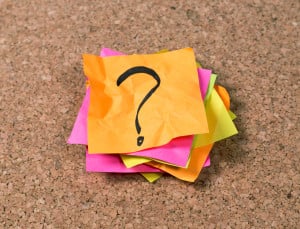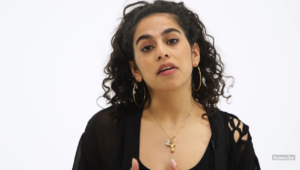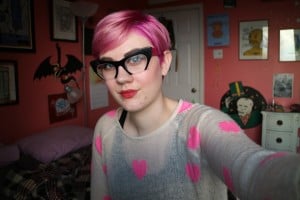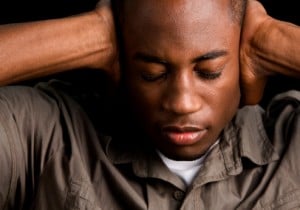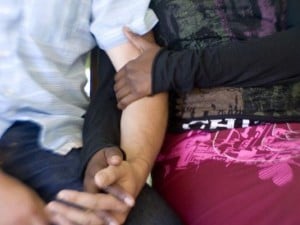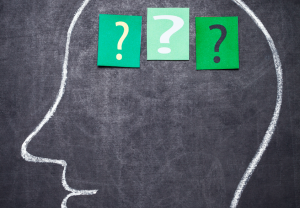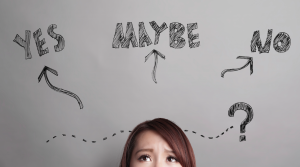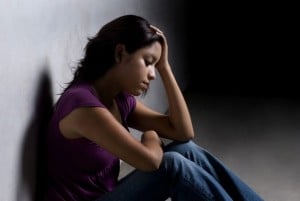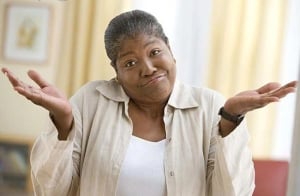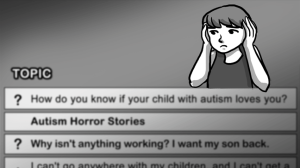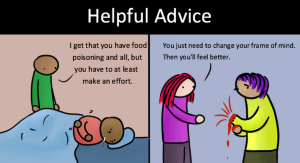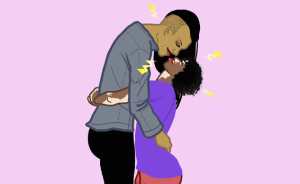For a while, I thought I was gay. And maybe I was for some of that time – there’s nothing wrong with being gay. But I’m definitely not now.
I thought I was gay because I thought I was a man, and I thought I was only and always attracted to other men.
I don’t know what gender I am anymore, if any. I knew before coming to that particular realization that I’m also not only, and haven’t always been, attracted to men. Additionally, I realized I don’t know what exactly “attraction” means.
I know for certain I’m not heterosexual – without a stable gender, I’m not even sure I could be. And when I first began to have these self-revelations, I also knew that I needed space to explore all of these complications.
As I spent time figuring out what they meant, I discovered that if I must have an identification that makes sense to others who need to see me with some sort of stability, it would be “queer.”
But that’s only because, for me, “queer” inherently defies stable identification.
Queer has many different facets.
Some use it to encompass all non-heterosexual, non-cisgender identities. That’s an understandable use of the term – like I mentioned, I interpret it to be partially about giving space for exploring gender and sexuality, and including so many different groups of people demands that space, demands a challenge to stability.
Certainly a wide variety of non-heterosexual, non-cisgender folks are queer.
But though queer might cover some part of that spectrum, it is not limited to it. I am not gay nor lesbian nor bisexual nor transgender. I am not anything other than just queer.
There are people who some of you might call “straight” if you looked at them and their partners and impose genders onto them, but who are actually “queer.” And many gay, lesbian, and transgender individuals do not identify as queer.
Like plenty of the names marginalized people call themselves, queer has a fraught history of reclamation, many controversial political implications, and a universalizing aspect that is too contradictory for some.
Yet, even here at Everyday Feminism, we sometimes use gay and queer interchangeably. Not to set the two in opposition or even to say they cannot sometimes overlap, here is why I think distinguishing the two might help people who are still exploring their gender and sexuality.
1. Queer Is a Slur for Some and a Reclamation for Others
I’m not a queer historian and I’ve still got a lot to learn, so I’ll stick to the basics. Here’s what I know so far: queer literally meant just “strange” or “peculiar,” indicating a deviation from the norm. It was turned into a pejorative to describe those with non-heterosexual desires and behaviors about a century ago.
For some, there’s simply too much pain associated with the word for so many people. I understand that.
As for me, I’m all about reclamation and taking power from oppressive systems whenever and however I can.
You can’t tell me that you get to change a word with a meaning as beautiful as “peculiar” and I don’t get to take it back from you.
I’m also young and haven’t lived through the widespread use of queer as a derogatory term, so my feelings are admittedly biased.
The movement to reclaim it as an affirmation caught on relatively recently, as did queerness as a theoretical framework, or “queer theory.” Queer’s not too distant past as a slur explains a lot of the continued resistance to its use.
Queer theorists, influenced in part by the work of French philosopher Michel Foucault, usually deal with sexuality not removed from gender but simultaneously, and questioned them both. Many push back against the essentialist idea that sex and gender are different and question the limitations inherent in a binary gendered perspective.
Recognized alongside the likes of Judith Butler and Eve Sedgwick as one of the most influential queer theorist, José Esteban Muñoz explained in the book Feeling Utopia, “We have never been queer, yet queerness exists for us as an ideality that can be distilled from the past and used to imagine a future. The future is queerness’s domain.”
Queerness was a political question that asked but didn’t necessarily see answers to the questions: “What is sex anyway? What is gender? What is sexuality? Can we ever truly know?”
And some non-heterosexual, non-cisgender people choose not or have yet to invest in that political question as is their prerogative — and that’s okay, too.
2. There’s So Much Erasure of People of Color, Gender Nonconforming, Non-Binary, and Other People In “Gay” and “Queer” Spaces
As a Black person in America, my experience with gender and sexuality is going to be vastly different than a similarly situated white person. That’s all good and doesn’t mean we can’t find solidarity as we fight our different but still gendered struggles against cisheterosexism.
But that solidarity often goes one way.
Go to your mainstream “gay” publications and look at the leadership of HRC — you’d think you were looking at the Oscars.
It’s white. It’s male. It’s cisgender. It’s committed to the gender binary of only men and women existing. It’s not me.
And don’t get my started on “gay” nightclubs in any cosmopolitan city outside of an “ethnic” night. My last time at one was not only an experience of being surrounded by a sea of white faces, dancing to music to which I find no connection, and swarmed by a maleness I don’t have.
It was white faces that can’t perceive Black ones, blatant cultural appropriation, and people with no interest in recognizing my lack of maleness.
That doesn’t mean non-white, non-male, non-cisgender folks can’t find a connection in that space, or make their own spaces within it. I’m a fan of reclamation, after all, and if it were to technically describe me (it doesn’t), I maybe would embrace it differently.
I find myself in non-white, non-male, and non-cisgender affirming gay spaces often, and they are lovely. But queer spaces also provide me with something that is vitally different.
Queerness, as I said, is specifically (supposed) to give room to move outside of the narrowness that is “normal” concepts of identity. It is specifically (supposed) to embrace the vastness of difference, which would ostensibly include more than white, cisgender men.
But white supremacist cisheterosexism is invasive, and is nearly impossible to escape in the world we live in today.
It’s worth noting that queer is an English word, so the limitations of this language in defining pre-colonial nonwhite cultures and nonwhite cultures that move away from their colonized histories abound.
Those who became the prominent leaders in the movement to reclaim queerness were still predominantly white as well.
They are, however – or should be – exploring what it means to be more than just white if truly operating with a queer framework. But when that exploration is “not yet” complete, as Munoz implies it can never be, who is hurt in the meantime?
I recently had a white queer person tell me I was “taking up space” from non-binary people by claiming my identity as non-binary because I am often perceived as male.
This person could only conceive of a queer “space” that looked like what they were used to, and my Black body which they read as male could not fit even in their queer world.
Many people of color, gender non-conforming people, or non-binary folks reject labels altogether. The label fight is just not for them. Based on my understanding of queerness, I interpret even that rejection a queer action, regardless of how one is identified, and it too has great importance.
We should give room to folks to follow their journey however it comes to them (as long as it doesn’t stop others from following theirs). That is queerness, after all.
3. Gay and Queer Have Unique Relationships with the Concept of Sex
I am unashamed of sex. I have it frequently, and I love it. But my queerness is not limited to the question of sexuality.
Gayness, homosexuality, is inherently a question of sexuality. It’s not a wrong question. In fact, it’s an important question for queerness, too, which is why gay and queer are compatible. It just isn’t the only or central question.
When I thought myself gay – it was an identity that had everything to do with the gender of whom I was sexually attracted to.
But as a queer person, I don’t even know what my gender is. I don’t even know what gender is. How could I know how the gender of people I like relates to mine? How could I know if I am “homo” or “hetero” or “bi” if I’m not the same as or opposite of anyone?
My relationship with gayness was defined by what I thought I knew myself to like. But I no longer know how I know what I like. Is “liking” based on sex or intimacy? What is sex without intimacy? Intimacy without sex?
If intimacy means more to me than sex, does having intimacy with someone without having sex with them define my sexuality? Does having sex without intimacy?
What is sex?
What is intimacy?
None of those things are defined enough for me to identify in any way other than in a way that allows them to be undefined. Exploring my queerness, those are questions I ask myself every day. And maybe there is no one answer to any of them. Maybe they change from year to year or day to day and person to person. Maybe I’ll never know.
And for some people, they are defined enough to be both gay and queer in a given moment. Maybe that will change for those same people like it did for me. And if it does or doesn’t, that’s okay. That’s the peculiarity of queerness.
***
Gayness and queerness are two different things, but sometimes gayness is a part of queerness and vice-versa.
Ultimately, this language is limited, and so it follows that there are limitations to how we describe ourselves. I’m still figuring out how to describe myself.
But I wouldn’t have had the opportunity to figure that out if I didn’t know that there were other ways.
If I didn’t know that queer was different than gay. If I knew that one size didn’t and doesn’t have to fit everyone.
There are other ways – there are always other ways – for me, you, and everyone else.
Be queer, be gay, be both, be neither, but be you.
The more we expand what “being” could mean, the more this is possible.
[do_widget id=”text-101″]
Hari Ziyad is a Contributing Writer for Everyday Feminism and a Brooklyn-based storyteller. They are the Editor in Chief of RaceBaitR, a space dedicated to imagining and working toward a world outside of the white supremacist cisheteropatriarchal capitalistic gaze, and their work has been featured on Gawker, The Guardian, Out, Ebony, Mic, Colorlines, Paste Magazine, Black Girl Dangerous, Young Colored and Angry, The Feminist Wire, and The Each Other Project. They are also an assistant editor for Vinyl Poetry & Prose. You can find them (mostly) ignoring racists on Twitter @RaceBaitR and Facebook.
Search our 3000+ articles!
Read our articles about:
Our online racial justice training
Used by hundreds of universities, non-profits, and businesses.
Click to learn more


